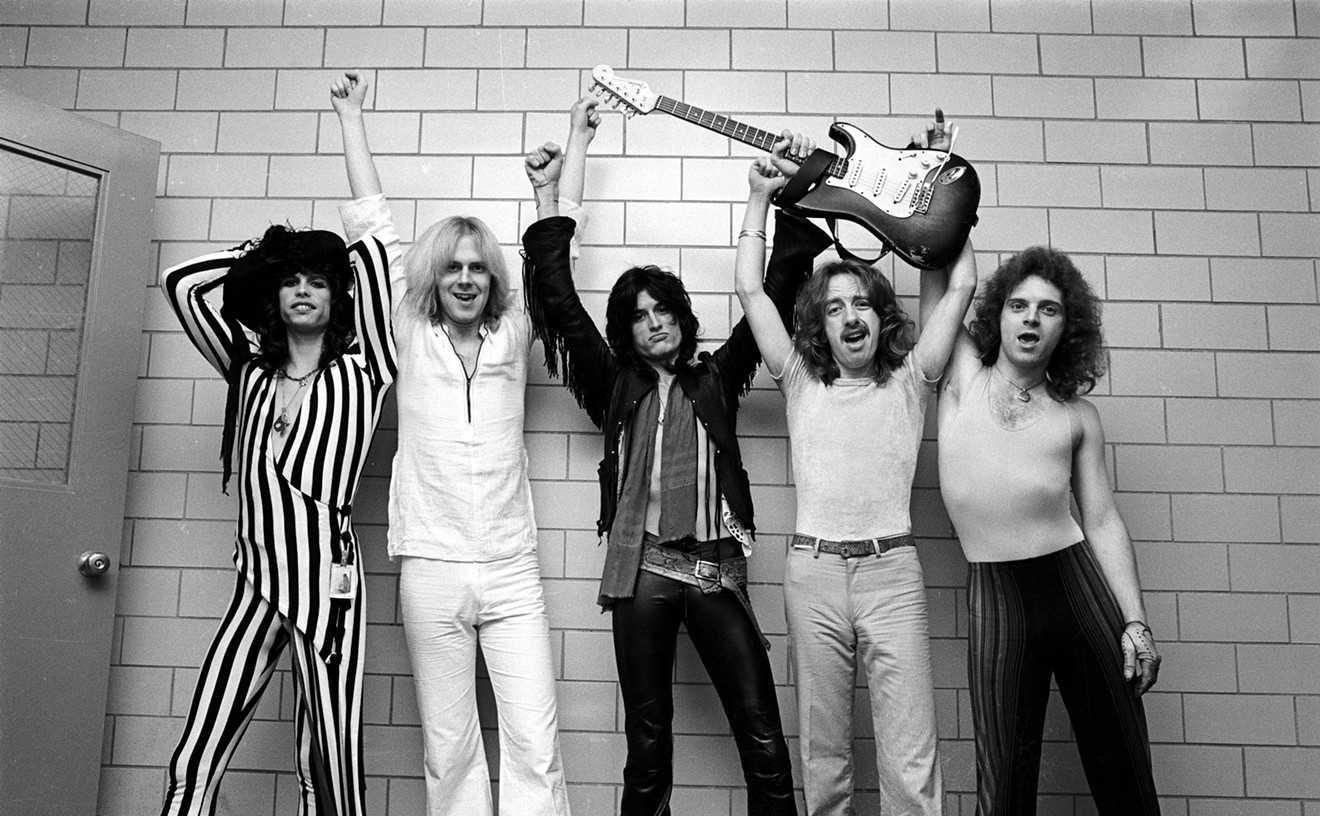What would it take for you to believe there was a conspiracy against you? One involving the U.S. government? One in which your loved ones had been murdered?
Wherever John Trudell's life leads, he will always be able to close his eyes and return to February 1979. Twelve hours after he burned an American flag in front of the FBI building in Washington, D.C., his wife Tina, her mother and the couple's three children died in a mysterious blaze. For Trudell there has never been any question that the fire at his Nevada home was a payback.
Numbed by the tragedy, Trudell resigned his presidency of the American Indian Movement (AIM), an office he had held since he helped found the organization with Russell Means, Dennis Banks and others in 1973. Drawn to the Native American cause by the occupation of Alcatraz in 1969, Trudell, himself half Santee Sioux, became the movement's chief visionary and knife-edged orator.
But after the fire, Trudell was overwhelmed by silence. He withdrew from the world. Even old friends like Cree singer Buffy Sainte-Marie, who calls him "a person in control of a powerful righteousness," were unable to comfort him. Finally, in desperation, he turned to words--to writing what he calls "his lines."
These days his lines become the topic of nearly every conversation John Trudell has. If he's not reciting them on a musical album, like his recent AKA Grafitti Man, he's trying to remember them in front of a camera. Trudell plays himself in two current films: Thunderheart, a murder mystery in which he appears as Jimmy Looks Twice, the spiritual leader of the fictional Aboriginal Rights Movement, and the documentary Incident at Oglala, in which he speaks about the real-life model for ARM. (See related story in Reel Stuff, page 40.)
But mostly Trudell has worked as a musician recently, writing and singing his own songs. Besides his appearance in Incident at Oglala, Trudell collaborated with Jackson Browne on the movie's score.
Trudell's acting in both films has been universally hailed as having a rare passion and integrity. In Oglala, it's clear what's made Trudell such a threat to the white establishment. With his flashing eyes and articulate delivery, he injects a zealot's fire into one of AIM's most well-worn lines: "We are caught between a past and present in a society that wants to deny us a future."
The flames that charred Trudell's life 13 years ago were ruled "of undetermined origin." Both the Bureau of Indian Affairs and the FBI concluded that the fire that destroyed Trudell's home in Duck Valley on the Shoshone Paiute reservation in Nevada began in the fireplace. After cursory investigations, both agencies declared the case closed.
But for Trudell, there is no question that the two burnings--one in Washington, D.C., and one in Nevada--are linked. When asked about it today, he uses words like "arson" and "murder." It's clear that believing in a conspiracy has become second nature for him. In recent years, he's learned that his own FBI file numbers somewhere in excess of 17,000 pages. "What happened to my family tells me that I was closer to the truth than even I knew," Trudell says from a home he's staying at in Los Angeles. Still believing himself under FBI surveillance, he has no permanent address. "Not having a permament address sounds great, but it has its drawbacks, believe me," he says.
"What my FBI file reflects to me is their absurdity," he continues, his voice taking on an intensity that has become customary. "Seventeen thousand pages is a lot of trees to assassinate to spy on someone. On the other hand, I don't know how many agents I'm keeping off the streets, but if they're spying on me, at least they're not out killing someone else."
In April the independent record label Rykodisc released AKA Grafitti Man, a compilation of Trudell's previous cassette-only releases. Much of Trudell's musical career is due to his friendship with Jackson Browne, whom he met the same year his family was murdered. He began appearing with Browne at benefits and spending time with him in the studio.
In 1982 Trudell began to set his lines to music. His first attempt was called Tribal Voice. A simple recording, nearly primitive by AKA Grafitti Man standards, Tribal Voice features Trudell chanting and reading his poetry over drums. Unsatisfied, Trudell searched for a collaborator who could give his talents a shape and direction. In 1985 he found that partner in Oklahoma-born Jesse Ed Davis. A Kiowa, Davis was a musical legend by the time he and Trudell joined forces to form the Grafitti Band. A guitarist, singer and songwriter, Davis had toured with Browne, all the former Beatles and, most prominently, Bob Dylan. Dylan, in fact, gave the duo its biggest boost when he told Rolling Stone that Davis and Trudell's first album together (also called AKA Grafitti Man) was "one of the best albums of 1986." He then had it played over the public-address system during his own 1987 concert tour.
The new Rykodisc album contains several cuts from that tape as well as tunes from Heart Jump Bouquet, the second Davis/Trudell collaboration. In 1988 Davis died unexpectedly, leaving Trudell to forge on with his band's second guitarist, Mark Shark. Together, Shark and Trudell recorded and released Fables and Other Realities. The success of that disc won Trudell and the band a spot as the opening act on a tour by Australian alternative band Midnight Oil.
The new AKA Grafitti Man is a compilation of material from all three of Trudell's previous albums. In 1987 Trudell also self-produced a second spoken-word cassette called . . .But This Isn't El Salvador.
Widely praised for both its rocking music and tough lyrics, the new AKA Grafitti Man is filled with bluesy pop-rock over which Trudell speaks in a deadpan voice that recalls Lou Reed's emotionless croak. (Trudell says he's only peripherally aware of Reed's work.) He often breaks into a strained yet supple singing voice for the choruses.
Ably assisted by executive producer Jackson Browne and name guests like Kris Kristofferson and the late Jesse Ed Davis, the band fills the space behind Trudell's words with Reedlike grooves that vary from a funky chug to soaring melodies and outright Springsteenesque gut-pop.
AKA Grafitti Man has won honest praise from nearly every corner of the envy-ridden music business. Trudell's importance in the musical community was confirmed this past weekend when he delivered the keynote address at the 13th annual New Music Seminar in New York.
A new album is already in the works, and Trudell plans to begin touring later this summer with a revamped Grafitti Band. The most surprising aspect of AKA Grafitti Man is the depth of Trudell's rock n' roll fervor. Some of the same energy he once used in defense of AIM has now gone into songs like "Baby Boom Che"--a paean to Elvis. Trudell is quick to mention that he penned the tune in 1985, the year Elvis would have turned 50. It's not surprising that a tune about the white king of rock n' roll, or songs like the flippant-sounding "Rockin' the Res," have drawn the ire of some in the Native American community. Trudell, they charge, has abandoned his political commitment for the life of a rock star. Trudell himself admits that working on a rock album at Groove Masters Studios in Santa Monica is a long way from the stand-off at Alcatraz.
But he also shrugs off the suggestion that he's betrayed the Native American cause, preferring to speak about the roots of his music.
"If you listen to the melody of 'Baby Boom Che' you'll hear a variation on 'Love Me Tender,'" he says. "Elvis, in turn, got 'Love Me Tender' from an old folk song called 'Aura Lee.' "I'm not waving Elvis flags here, but I am acknowledging his social significance. Elvis sang the music of the blacks to the whites. He was a very important but overlooked part of the civil rights struggle in the Sixties. He also liberated the music of the whites. Up until then what did they have? Frank Sinatra, Tony Bennett, Perry Como. No music of feelings."
Since the 1979 fire, Trudell has stepped back from politics, and is no longer part of any Native American organization. Music has become the medium through which he communicates.
"I identify with no political organization," Trudell says. "Politics are based on competition at at time when we need cooperation. They're based on control when we need free thought. They're based on ego at a time when we don't need any more of that."
He's especially reticent when it comes to speaking about AIM, the organization he as much as anyone else is responsible for shaping. "I don't need to adhere to a party line, even if it's our party, for a false sense of unity," he says.
"We don't need leaders or healers now; we need teachers. When people become leaders, they start liking the perks too much. And at the same time, having leaders means that the followers don't have to take responsibility."
Although it looks incongruous from the outside, switching from activism to entertainment has been easy for a man described by one writer as "an incendiary talker." "I really can't sing or dance," Trudell says with a laugh. "And to deal with the practical reality of it, I don't really know how to play a note, either.
"But for me, talking and music go together. Both can communicate feelings. "So for me, being onstage with a rock band is like a hallucination. So when Thunderheart came up, I said, 'Why not?' I wanted to see what it was like to do someone else's lines."
But Trudell also managed to do some of his own lines in the movie. Unhappy with the way his character was being portrayed, he was allowed to rewrite some of his dialogue.
There is a downside, however, to Trudell's new high profile--now anyone still looking knows where to find him. That's why he is, in many ways, on the run. Today, despite the time passed, Trudell can't stop looking over his shoulder. The memories of February 1979 keep him restless. "I've thought about leaving, but where would I go?" he says, a weary tone entering his voice. "If everyone looks the other way, that's their choice. But there is a price to be paid for priceless things. When your government and society turn authoritarian, regardless of their past record, then you're handing your children and grandchildren over to a monster.










